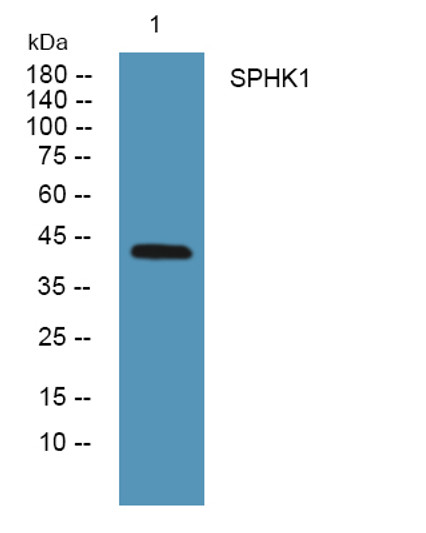| Function | Catalyzes the phosphorylation of sphingosine to form sphingosine 1-phosphate (SPP), a lipid mediator with both intra- and extracellular functions. Also acts on D-erythro-sphingosine and to a lesser extent sphinganine, but not other lipids, such as D,L-threo-dihydrosphingosine, N,N-dimethylsphingosine, diacylglycerol, ceramide, or phosphatidylinositol. In contrast to proapoptotic SPHK2, has a negative effect on intracellular ceramide levels, enhances cell growth and inhibits apoptosis. Involved in the regulation of inflammatory response and neuroinflammation. Via the product sphingosine 1-phosphate, stimulates TRAF2 E3 ubiquitin ligase activity, and promotes activation of NF-kappa-B in response to TNF signaling leading to IL17 secretion. In response to TNF and in parallel to NF-kappa-B activation, negatively regulates RANTES induction through p38 MAPK signaling pathway. Involved in endocytic membrane trafficking induced by sphingosine, recruited to dilate endosomes, also plays a role on later stages of endosomal maturation and membrane fusion independently of its kinase activity. In Purkinje cells, seems to be also involved in the regulation of autophagosome-lysosome fusion upon VEGFA. Has serine acetyltransferase activity on PTGS2/COX2 in an acetyl-CoA dependent manner. The acetyltransferase activity increases in presence of the kinase substrate, sphingosine. During neuroinflammation, through PTGS2 acetylation, promotes neuronal secretion of specialized preresolving mediators (SPMs), especially 15-R-lipoxin A4, which results in an increase of phagocytic microglia. |
| Protein Name | Sphingosine Kinase 1Sk 1Spk 1Acetyltransferase Sphk1 |
| Database Links | Reactome: R-HSA-1660661Reactome: R-HSA-390471Reactome: R-HSA-5218921Reactome: R-HSA-9009391Reactome: R-HSA-9833482 |
| Cellular Localisation | CytoplasmNucleusCell MembraneEndosome MembranePeripheral Membrane ProteinMembraneClathrin-Coated PitSynapseTranslocated From The Cytoplasm To The Plasma Membrane In A Cib1-Dependent MannerBinds To Membranes Containing Negatively Charged Lipids But Not Neutral LipidsRecruited To Endocytic Membranes By Sphingosine Where Promotes Membrane Fusion |
| Alternative Antibody Names | Anti-Sphingosine Kinase 1 antibodyAnti-Sk 1 antibodyAnti-Spk 1 antibodyAnti-Acetyltransferase Sphk1 antibodyAnti-SPHK1 antibodyAnti-SK1 antibodyAnti-SPHK antibodyAnti-SPK antibody |
Information sourced from Uniprot.org









